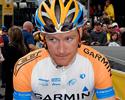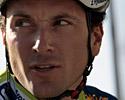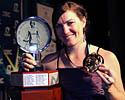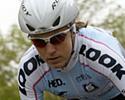First Edition Cycling News, February 25, 2009Edited by Greg Johnson and Les Clarke Thieves clean out Zabriskie's house
While David Zabriskie was busy claiming second place at last week's Tour of California, thieves were at work stealing over $150,000 USD worth of the American's belongings. The figure doesn't include the value of two vehicles taken from Zabriskie's place during the raid. The Garmin - Slipstream rider didn't learn of the break-in until he returned to his Salt Lake City home on Tuesday. Salt Lake City Police said the theft occurred some time between February 13 - 23, while Zabriskie was contesting the Tour of California. "My head is just swimming with the things they've taken," said Zabriskie's mother Sherry Hamik to Deseret News. "They even took his clothes. There's not much left." In addition to electronic equipment and, remarkably, two vehicles, thieves took both sporting and comic memorabilia from Zabriskie's house. "The Marvel sideshow statues are very distinctive," a release from Salt Lake City Police read. "They stand two-three feet tall and are very heavy. The stolen statues were of: Hellboy pistol figurine, Ash Army of Darkness, Tomb Raider Lara Croft, The Punisher, Alien, Ironman Limited Edition, and a Gears of War character." Items stolen include the following: News of the theft put a put a damper on an otherwise encouraging month for Zabriskie, who was also fined for speeding on the way home from California. He jumped up to second place in the Tour of California with a solid time trial, one spot behind compatriot Levi Leipheimer (Astana). Detectives have appealed for help from the public, as they expect some of these items to turn up in local pawnshops or online auction sites. Anyone with any information on the burglary or the location of the items is asked to call the Tips for Cash line at 799-INFO (4636) and reference case #09-32767. Should anyone from outside the United States of America come across some of the smaller items, the Salt Lake City Police Department can be contacted at slcpd@slcgov.com Basso dismisses hour record attempt ideaBy Gregor Brown
Ivan Basso, of team Liquigas, has dismissed any chance of attempting the hour record in 2009. Basso confirmed that his focus for 2009 is a victory in his home stage race, the Giro d'Italia. "I am not thinking about it because I have just returned from a two-year disqualification," he told Cyclingnews. "It is better to think about the Giro right now." Basso had significantly improved on his time trial form in the years leading up to his suspension. His form is still somewhat unknown since returning from the two-year ban, which ended last October. Basso raced a time trial at the Tour de San Luis, but had to pull out of the Tour of California right before its long time trial due to a training accident. Some famous Italians have held the hour record throughout history, including: Fausto Coppi (1942) and Francesco Moser (1984). The current record of 49.7 kilometres was set by Czech Ondrej Sosenka in July 2005. One of the key rivals that Basso will face at the Giro d'Italia in May, Lance Armstrong, is rumoured to be considering a record attempt. Earlier this month the American posted an entry on his personal blog with a photo of a suitable track bike. "I had not heard about Armstrong and the hour record attempt," said Basso. "I think that he only has the Giro d'Italia in mind right now." The hour record is established by riding the furthest distance on a velodrome in 60 minutes. The International Cycling Union standardised equipment limits in 2000, disallowing aero helmets, wheels and frames. Australia announces track worlds candidates
Anna Meares, the only Australian medal winner at last year's Beijing Olympic Games, will lead the Australian squad at next month's UCI Track World Championships in Poland. Meares is one of few experienced senior riders in the squad, as the nation looks to develop its younger talent ready for the London Olympic Games in 2012. The announcement by Cycling Australia is a long list, with 10 riders expect to vie for a final spot in the squad at a camp in Adelaide. "One male and up to two female riders might not progress to the World Championships," noted the announcement. "Selection of the final team will be based on trials, training performances and general assessment by national track coaches during the camp." Meares is joined on the list of definite starters by Dan Ellils, Kaarle McCulloch, Cameron Meyer, Jason Niblett, Shane Perkins and Scott Sunderland. The final Toshiba-supported squad is expected to be announced by March 12. Confirmed Australians for World Championships squad: Dan Ellils,
Anna Meares, Kaarle McCulloch, Cameron Meyer, Jason Niblett, Shane Perkins
and Scott Sunderland. Marvulli, Hayles headline Australian madison eventFormer madison world champions Franco Marvulli and Rob Hayles will headline the 2009 Australian Madison Championship, to be contested on February 28 at Melbourne's DISC velodrome. Marvulli, a two-time world champion in both the madison and scratch race, will partner Germany's Leif Lampater, a former winner of the madison at the UCI Track World Cup series in 2005. The riders are headed for Australia having wrapped up the European six-day series at the Lotto 6 - Daagse last weekend. Lampater paired with Erik Zabel in January to successfully defend their title at the Six Days of Bremen, with Marvulli and partner finishing in second place. Hayles, the Athens Olympic Games madison bronze medallist, will team up with former UCI Junior World Champion Peter Kennaugh. The international riders will take on locals Sean Finning (Castlemaine CC), James Langedyk (Geelong CC), Tim Decker (Bendigo & Districts CC), Luke Durbridge (WA), Luke Davison, Richard Lang, Alex Carver and Aaron Donnelly. The Australian Madison Championship program will also feature the Sid Patterson Grand Prix, featuring local and international competitors, as a support event. Local women ready to tackle Kiwi racesBy Greg Johnson
Australian and New Zealand riders are looking forward to battling on home soil during this week's Tour of New Zealand, which starts today. The stage race and its following one day women's race are some of the region's biggest women's races, following the loss of Australia's Women's World Cup round and adjoining Geelong Tour. Joanne Kiesanowski is hoping the titles stay with local riders and in particular the New Zealand National Team that she is leading. "I'm really looking forward to this week of racing, always good to race an international race in New Zealand," she told Cyclingnews. "The stages look long and of course we have the last day finishing up Admirals Hill which is always tough. "Its great to be riding for the national team too, our team has some strong riders so we will be looking to make sure the yellow jersey stays with a native," she added. Australia's Tiffany Cromwell is one rider hoping to provide a trans-Tasman upset. Cromwell will feature in the Australian National Team led by Rochelle Gilmore. "It's a tour better suited to my strengths," said Cromwell. "Were going into it with a strong team and have a few cards to play. "Personally I'm hoping to have a strong tour as I've been climbing pretty well lately and have some good form," she added. "Looking at the course, the tour is probably going to be won on the last day with the hill top finish of admiral hill." In addition to plans for herself in the Tour of New Zealand, Cromwell has plans for her team in the following one day event. The youngster is hoping to help set up Gilmore for a shot at victory. "As for the one day race I will be playing much more of a support role as the circuit is suited more to a bunch finish," she said. Testing times for KuyckxFormer Landbouwkrediet-Tönissteiner rider Jan Kuyckx still hasn't found a team for this season. After his experience with the failed H2O-Telteck squad, and another flash in the pan, Turbo's Hoet, time is running out for the Belgian to secure himself a ride for 2009. This doesn't mean he's exempt from out-of-competition doping tests, however. Kuyckx, who took second in last year's edition of Paris-Tours was, visited by an anti-doping tester, prompting him to ask whether it was necessary to conduct the control. "I asked him which such control outside competition was required, because I neither a team nor have a license," Kuyckx told Gazet van Antwerpen. "I got no specific answer and then have fulfilled my duty." It's also reported that Kuyckx has vague links with a Polish team, but nothing has yet been confirmed. Mixed fortunes for Cinelli-Down UnderThe Cinelli-Down Under team has experienced mixed fortunes over the past two weeks. Nico Mattan's outfit has received a International Cycling Union (UCI) licence, but it won't be able to ride some of the events team management had hoped to participate in. Having hoped to ride this weekend's Omloop Het Nieuwsblad, the team's licensing arrangements involving its Australian connections weren't finalised until Monday, and Mattan is confident the Belgian end of proceedings won't be a problem. "On Monday the licence was finally in the mailbox," Mattan told Het Laatste Nieuws. "Now our Belgian licence needs to be in order, but that's just a formality." The team, complete with Belgian Frank Vandenbroucke on board, will begin its campaign in Saturday's Beverbeek Classic. It's the first of a number of Belgian races for the outfit, although Mattan was disappointed other events couldn't be included in that program. "We won't start the E3 Prijs and the Three Days of De Panne because both are HC-ranked events," Mattan explained. "The hunger [to race] is there for Frank Vandenbroucke. He is very concerned about the fate of the team. "On training runs on the flat, everyone is on Frank's wheel, although the mountains take some effort, because he still needs to lose four to five kilograms," he added. Cinelli-Down Under's Program: Beverbeek Classic (Feb 27), GP Samyn (March 4), Driedaagse van West-Vlaanderen (March 6-8), Omloop van het Waasland (March 15), Nokere Koerse (March 18), Dwars door Vlaanderen (March 25), Brabantse Pijl (March 28). Cycling still leading anti-doping fightDespite negative headlines emerging from cycling's fight against doping, comments by World Anti-Doping Agency chief John Fahey indicate that the sport still leads efforts in this area. Fahey addressed the organisation's fourth media symposium and called for greater use of the Biological Passport and athletes' whereabouts forms. The latter tool in particular is used extensively in cycling, indicating that the sport is at the forefront of trying to stop illegal performance enhancement. "Under WADA's leadership, the traditional anti-doping model has evolved from a strategy focusing only on the athlete and relying mainly on testing, research and education, to a new kind of model incorporating also the athlete's entourage and the upstream elements of doping," said Fahey. "We need to continue to implement innovations through new types of cooperation, new strategies and ideas borrowed from other fields." The case of Michael Rasmussen during the 2007 Tour de France is an example of cycling's willingness to use the available tools to combat cheats in sport. The athletes' whereabouts regulations were used to discover ambiguities surrounding the Dane's training and preparation before the Tour had even begun. It's these regulations that are now being instituted in other sports, and athletes are not happy about it. In Belgium, 65 athletes have initiated legal proceedings against the whereabouts system, basing their case on the European Convention on Human Rights. Professional cyclists have had to deal with these whereabouts stipulations for years, and despite not liking them, most deal with them as a necessary part of the job description. Fahey also referred to the work done by WADA to enlist the assistance of pharmaceutical companies and Interpol to help detect new performance-enhancing methods and prevent the trafficking of them respectively. Cycling has again been at the forefront of utilising these methods, with the detection of CERA - a new generation of EPO - in the blood of Stefan Schumacher, Riccardo Riccò, Bernhard Kohl and Leonardo Piepoli during last year's Tour. Additionally, for some time, anti-narcotics bureaus of national police forces have monitored the sport for trafficking of substances to be used in athletes. One area where cycling has lagged somewhat is the implementation of the Biological Passport. Touted as the next big step in combating illegal substance use, politicking between WADA, the UCI, and race organisers has caused a deterioration in relations between these parties in recent years. Consequently, the co-operation needed to institute an Athlete Passport programme has suffered. Fahey remains upbeat about its use in all sports however. "Potentially, the Athlete Passport developed under WADA's leadership could represent one of the most significant advances in the global fight against doping in sport in the coming months and years," he said. Previous News Next News (All rights reserved/Copyright Future Publishing (Overseas) Limited 2009) |

|
January 2009 |
Recently on Cyclingnews.com |




